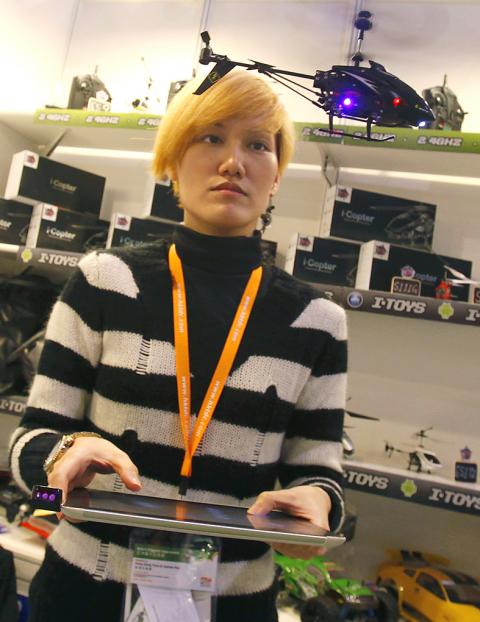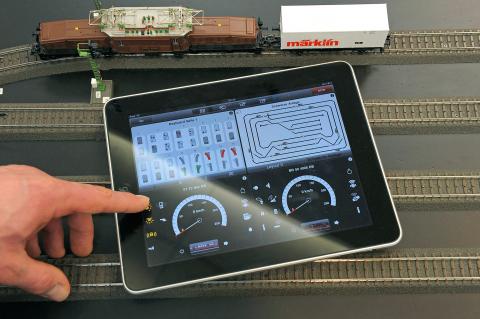Having found this holiday season that they cannot beat Apple Inc’s iPad, iPhone and iPod, toymakers have lined up a host of playthings that come to life when hooked up to the devices, gadgets that kids love to play with.
Industry insiders call them “Appcessories,” and expect a wide array of these items to be on display at the American Toy Fair, which officially opens to the public in New York today.
“The manufacturers have realized this is a hot area, and they are all jumping on it,” said TimetoPlayMag.com editor-in-chief Jim Silver. “It is an opportunity to extend the ages you are selling to.”

Photo: Reuters
The trend comes as companies, scarred by a holiday season when toy sales fell 3 percent in the US, look beyond traditional toys to woo tech-savvy kids, many of whom have grown up playing on their parents’ smartphones or their own gaming consoles.
“Today’s gamer is looking for experiences in games that include the marriage of digital and analog, face-to-face, and off the board gaming,” Hasbro Inc chief executive Brian Goldner said.
Hasbro, the maker of G.I. Joe toys and the Monopoly board game, plans to jump on the Appcessory bandwagon through its zAPPed gaming platform.

Photo: EPA
When you play with Hasbro’s The Game of Life zAPPed, you will still move your car from space to space and select your path to retirement on a game board, but now you spin, get paid, sue other players and make important decisions on your iPad, after downloading a free app. The game will cost about US$25.
However, Hasbro is not the only firm to have entered this arena.
Canada’s Spin Master Ltd is betting big on an array of accessories for Apple products as well as devices running Goolge Inc’s Android operating system under the AppFinity label.
“When you talk about the holy grail of toys, manufacturers have been trying to find a way to marry the tech and the toy world,” Spin Master spokesperson Harold Chizick said, adding that Appcessories might just be what they were looking for.
Spin Master hopes its AppDrive will appeal to racing enthusiasts by allowing them to use a steering wheel that can hold an iPhone, and play racing games using an app on the iPhone, while AppFishing will enhance “virtual fishing” using a rod that can hold an iPhone. Priced at US$20 each, they will hit stores in the fall.
Industry heavyweight Mattel Inc will try to broaden the appeal of its classic brands such as Fisher-Price Inc and Barbie, as well as Monster High through its Apptivity line.
One product in this line is Fisher Price’s Laugh and Learn Apptivity Case, which is basically a US$20 sturdy case that will protect parents’ iPhones from “dribbles, drool and unwanted call-making.”
The item, which features beads, a mirror and free learning apps, will help babies practice hand-eye coordination, Mattel says.
Toymaker WowWee Group Ltd, known for its little robot toys, will unveil its AppGear line, which combines physical toys with iOS and Android apps. For example, in Alien Jailbreak, which is an augmented reality shooter game, the player looks through his or her smartphone and tries to stop aliens from escaping from prison. AppGear products will be sold at about US$10 to US$20.
Companies such as Discovery Bay Games and Crayola LLC also hope to offer compelling products in this category.
Rising teen cellphone ownership, growing demand for mobile computing devices such as tablets, and the explosive demand for mobile apps are other factors boosting the trend.
As of September 2009, 75 percent of US teens aged 12 to 17 had a cellphone, a number that has steadily increased from 45 percent in November 2004, a study by Pew Research Center showed.
“Until now, traditional retailers or brick-and-mortars have been unable to tap into this huge growing market. They’ve been left out of the app party,” said Mike Gonzales, creative director and digital brand manager for WowWee.
Like many others, Gonzales now sees “an opportunity to take a bite out of the app pie.”
At an event earlier this week, Toys“R”Us CEO Jerry Storch summed up the trend: “The combination of the physical world and virtual world is so powerful that it’s almost unexplainable.”
One of Storch’s favorites heading into the year is the followup to Activision’s Skylanders, a video game that comes with physical toys that spring to life on screen when they are hooked up to consoles such as Microsoft Corp’s Xbox or Sony Corp’s PlayStation. A chip inside the figurines stores a player’s progress in the game.
The latest iteration, called Skylanders Giants, will feature characters that are taller and have new kinds of power. The newer characters can also light up without needing batteries.
“Skylanders will be even larger in its second year than its first year. It could be one of the biggest toy franchises of all time,” Storch said.
While the toy industry is betting big on Appcessories, a few parents are skeptical.
Amanda Bergman, a New Jersey-based Web editor and mom of two, said she would “probably not” buy toys and games that will come to life with a tablet or smartphone.
“Sounds like kind of a hassle, to be honest. I’d prefer to maintain the separation between toys and iPad. And I feel like the novelty would wear off quickly,” said Bergman, who normally lets her children, three-year-old Elliott and five-year-old Adrian, spend one to two hours on average on her iPad.

WEAKER ACTIVITY: The sharpest deterioration was seen in the electronics and optical components sector, with the production index falling 13.2 points to 44.5 Taiwan’s manufacturing sector last month contracted for a second consecutive month, with the purchasing managers’ index (PMI) slipping to 48, reflecting ongoing caution over trade uncertainties, the Chung-Hua Institution for Economic Research (CIER, 中華經濟研究院) said yesterday. The decline reflects growing caution among companies amid uncertainty surrounding US tariffs, semiconductor duties and automotive import levies, and it is also likely linked to fading front-loading activity, CIER president Lien Hsien-ming (連賢明) said. “Some clients have started shifting orders to Southeast Asian countries where tariff regimes are already clear,” Lien told a news conference. Firms across the supply chain are also lowering stock levels to mitigate

Six Taiwanese companies, including contract chipmaker Taiwan Semiconductor Manufacturing Co (TSMC, 台積電), made the 2025 Fortune Global 500 list of the world’s largest firms by revenue. In a report published by New York-based Fortune magazine on Tuesday, Hon Hai Precision Industry Co (鴻海精密), also known as Foxconn Technology Group (富士康科技集團), ranked highest among Taiwanese firms, placing 28th with revenue of US$213.69 billion. Up 60 spots from last year, TSMC rose to No. 126 with US$90.16 billion in revenue, followed by Quanta Computer Inc (廣達) at 348th, Pegatron Corp (和碩) at 461st, CPC Corp, Taiwan (台灣中油) at 494th and Wistron Corp (緯創) at

NEW PRODUCTS: MediaTek plans to roll out new products this quarter, including a flagship mobile phone chip and a GB10 chip that it is codeveloping with Nvidia Corp MediaTek Inc (聯發科) yesterday projected that revenue this quarter would dip by 7 to 13 percent to between NT$130.1 billion and NT$140 billion (US$4.38 billion and US$4.71 billion), compared with NT$150.37 billion last quarter, which it attributed to subdued front-loading demand and unfavorable foreign exchange rates. The Hsinchu-based chip designer said that the forecast factored in the negative effects of an estimated 6 percent appreciation of the New Taiwan dollar against the greenback. “As some demand has been pulled into the first half of the year and resulted in a different quarterly pattern, we expect the third quarter revenue to decline sequentially,”

ASE Technology Holding Co (ASE, 日月光投控), the world’s biggest chip assembly and testing service provider, yesterday said it would boost equipment capital expenditure by up to 16 percent for this year to cope with strong customer demand for artificial intelligence (AI) applications. Aside from AI, a growing demand for semiconductors used in the automotive and industrial sectors is to drive ASE’s capacity next year, the Kaohsiung-based company said. “We do see the disparity between AI and other general sectors, and that pretty much aligns the scenario in the first half of this year,” ASE chief operating officer Tien Wu (吳田玉) told an